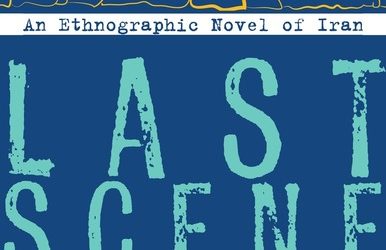"To me, life is a gift, and it's a blessing to just be alive. And each person should learn what a gift it is to be alive no matter how tough things get." — Tony Bennett Tony Bennett really sounds great at 95 years old. Check out his duets with Lady Gaga below....
Dr Roxanne Varzi: Creative Anthropologist
I recently had the chance to talk to Dr Roxanne Varzi, a writer, anthropologist, and filmmaker who was also the first Fulbright Awardee since the Islamic Revolution for research in Iran. She's doing such interesting work that is creative on many levels that I...
Supporting Young Dyslexics during the Pandemic
With all the continued upheaval due the pandemic, here's some advice for trying to keep the big picture of the coming school year. DYSLEXIC DEVELOPMENT HAS ITS OWN TIME TABLE There can be a very late bloom for a lot of the younger years for dyslexics - so don't...
Wellbeing: Managing Uncertainty
This pandemic is battle of endurance - for mind as well as body. There is nothing that is certain...except for uncertainty. For many of us that includes what work, education, or free time will look like. As dreadful as all that seems, I do know that some members of...
Princess Beatrice: The Gift of Dyslexia
"Even referring to it as a diagnosis, I feel, does a disservice to the brilliance of some of the most fantastic minds that we have... just shifting the narrative a little bit towards something that is positive, something that is impactful, can really help everyone." -...
How to Keep Writing During the Pandemic [Premium]
Despite all of the mechanical and logistical challenges of writing for dyslexics, there are many for whom writing is a strength. What makes good writing? So many things, but keen powers of observation, a good sense of humor, insight, feeling, these are all things that make good stories and storytelling. For some kids and adults, keeping a pandemic journal is therapeutic. It’s not limited to text. COVID comics anyone? Historians or watchers of Antiques Roadshow may recall how interesting pandemic or war time journals of the past were to transporting them into all the places and times of crises. Smithsonian has a post about the 1918 influenza diaries for those who might want to get some historical context on our present. Some people […]
White Noise Improves Reading Skills and Memory in Reading Disabilities [Premium]
Some of you may remember research in the past that showed that individuals with dyslexia have more difficulty screening out background noise (discussed in the news HERE). Students or adults with this difficulty can usually request quiet area for work or test-taking under the ADA or Americans for Disabilities Act. Now another research group has tested the effect of “white noise” on reading skills and memory recall in children with a reading disability. From the paper: “The study was conducted with a group of 30 children with RD and phonological decoding difficulties and two comparison groups: one consisting of skilled readers (n = 22) and another of children with mild orthographic reading problems and age adequate phonological decoding (n = 30). White noise […]
What Kind of Dysgraphia [Premium]
A recent clinical review of dysgraphia has defined dysgraphia in the following way: “At its broadest definition, dysgraphia is a disorder of writing ability at any stage, including problems with letter formation/legibility, letter spacing, spelling, fine motor coordination, rate of writing, grammar, and composition.” Developmental dysgraphia (i.e. dysgraphia not based on some known injury) is described in the same article as having a “difficulty in acquiring writing skills despite sufficient learning opportunity and cognitive potential.” When a teacher or other professional asks a parent about “what type of dysgraphia their student might have,” they may be referring to the so-called “5 Types of Dysgraphia”, that often include, “motor”, “dyslexic”, “spatial”, and so on – but these distinctions are rarely clear-cut in real life and […]
Dyslexia and Social Studies [Premium]
Many dyslexic students are natural storytellers and may even have a passion for history and analyzing various aspects of society and social change. As a subject Social Studies can be difficult for dyslexic students, so the question is how to build on strengths, but bypass challenges due to extensive reading and writing demands, and rote memorization. Dyslexic Strengths in Social Studies: Strengths in Social Studies may reflect all 4 of the dyslexic MIND strengths: spatial strengths in geography or movement of people, Interconnected reasoning strengths may allow students to see complex events from multiple perspectives and through multiple lenses. Narrative intelligence may help them immerse themselves in stories of the past and analyze decisions of different people experiencing different events. Dynamic reasoning strengths […]
Answer Apps and the Benefits of Learning in Reverse [Premium]
Conventional lecture courses for subjects with problem sets can be inefficient. For dyslexic students if the information comes in too quickly, they can’t follow steps as a teacher works through problems in real time. A recurring scenario for many students (and not just the dyslexic ones) is that to truly understand, the students must work through the material themselves at home. The lucky ones have a parent, sibling, or someone else to be a tutor, while others may struggle looking at incomplete notes with only a hazy idea of what teachers did to arrive at their answers. Having teachers notes or having a flipped classroom (watch a video first, then see the problems worked by a teacher) can improve this situation, but inevitably there […]
Learning with Dr. Sara Renzulli [Premium]
“I was identified as dyslexic and having ADHD in the fifth grade. I struggled quite a bit academically…” — Sara Renzulli, PhD, Visiting Professor, U Conn Recently I had the pleasure of talking to Dr. Sara Renzulli, a teacher in the Counselor Education department at the University of Connecticut, and daughter of illustrious educators, Drs. Joseph Renzulli and Sally Reis. I had discovered Sara’s interview at the 2E Newsletter and read some research publications of her work with college students. “My dyslexia made it extremely hard to learn how to read. I remember being so frustrated. If things were explained to me orally or read out loud to me, I understood what was going on. I just couldn’t decode words on my own […]
Finding the Word: Tip of the Tongue [Premium]
What is Tip of the Tongue? It’s trouble coming up with a word for something when you know what it is. It’s common for people of any age to have occasional “tip of the tongue” moments, but it also gets more common as we age (mid 60’s and older especially) and more common if you’re dyslexic. As researchers increasingly probe why tip of the tongue word retrieval happens, it’s relationship to dyslexia becomes increasingly clear…it’s because that type of word retrieval is associated with phonological representations of a word. The brain does not just file the word in one file folder. There is a location for the meaning of words, the sound of words, and the visual structure of words. It’s the filing […]






![How to Keep Writing During the Pandemic [Premium]](https://www.dyslexicadvantage.org/wp-content/uploads/2021/09/keep-writing-400x250.jpg)
![White Noise Improves Reading Skills and Memory in Reading Disabilities [Premium]](https://www.dyslexicadvantage.org/wp-content/uploads/2021/09/White-noise-2-400x250.jpg)
![What Kind of Dysgraphia [Premium]](https://www.dyslexicadvantage.org/wp-content/uploads/2021/09/What-kind-of-dysgraphia-2-400x250.jpg)
![Dyslexia and Social Studies [Premium]](https://www.dyslexicadvantage.org/wp-content/uploads/2021/09/Screen-Shot-2021-09-07-at-6.15.03-PM-400x250.png)
![Answer Apps and the Benefits of Learning in Reverse [Premium]](https://www.dyslexicadvantage.org/wp-content/uploads/2021/09/answer-apps-2-2-400x250.jpg)
![Learning with Dr. Sara Renzulli [Premium]](https://www.dyslexicadvantage.org/wp-content/uploads/2021/09/learning-with-dr-sara-1-400x250.png)
![Finding the Word: Tip of the Tongue [Premium]](https://www.dyslexicadvantage.org/wp-content/uploads/2021/08/Screen-Shot-2021-08-31-at-3.08.59-PM-400x250.png)













